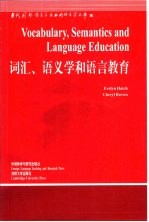图书介绍
词汇、语义学和语言教育 英文版pdf电子书版本下载

- (英)EvelynHatch,(英)CherylBrown著王初明导读 著
- 出版社: 北京:外语教学与研究出版社
- ISBN:7560024289
- 出版时间:2001
- 标注页数:477页
- 文件大小:21MB
- 文件页数:513页
- 主题词:
PDF下载
下载说明
词汇、语义学和语言教育 英文版PDF格式电子书版下载
下载的文件为RAR压缩包。需要使用解压软件进行解压得到PDF格式图书。建议使用BT下载工具Free Download Manager进行下载,简称FDM(免费,没有广告,支持多平台)。本站资源全部打包为BT种子。所以需要使用专业的BT下载软件进行下载。如 BitComet qBittorrent uTorrent等BT下载工具。迅雷目前由于本站不是热门资源。不推荐使用!后期资源热门了。安装了迅雷也可以迅雷进行下载!
(文件页数 要大于 标注页数,上中下等多册电子书除外)
注意:本站所有压缩包均有解压码: 点击下载压缩包解压工具
图书目录
Introduction 1
Preface by Haliday F 11
王宗炎序 F 12
Part 1 Semantics 13
1 Semantic features and semantic feature analysis 14
Features 14
Preface by Chomsky F 15
Features in synonyms and antonyms 19
沈家煊序 F 22
Features in definitions 23
Semantic features and grammar 24
导读 F 25
Evaluation of semantic feature analysis 28
Research and application 31
Preface F 33
2 Semantic field analysis 33
Semantic fields 33
Acknowledgments F 35
Semantic field displays 37
Evaluation of semantic field analysis 41
Research and application 44
Core meanings 47
3 Core meanings and prototype theory 47
Prototypes 52
Fuzzy categories,levels,and prototypes 58
Research and application 61
4 Relational models in semantics 64
Types of relations 65
Relational models 71
Relational models in dictionaries 75
Applying relational models 77
Research and application 83
Pervasiveness of figurative language 86
5 Semantics of figurative language 86
Categorizing figurative language 88
Metaphor as a universal process 92
Acquisition of metaphor 99
Literary and conceptual metaphor 102
Social models and metaphor 105
Metaphors of teaching and learning 107
Research and application 112
6 Semantic space across languages 115
Universal categories 116
Acquisition and error analysis 124
Error analysis,loan translation,and cognates 127
Predicting difficulty 131
Research and application 138
Scripts 145
7 Script semantics and conceptual structure 145
Scripts and semantics 151
Script semantics,language teaching,and testing 156
Thematic and conceptual structure theory 158
Summary of Part I 163
Research and application 164
Part Ⅱ Lexicon 169
8 Adding to the lexicon 170
Borrowing 170
Coinage 175
Names of people and places 176
Conversion 179
Shifts 181
Research and application 185
Compounding 189
9 Processes in word building 189
Acquisition of compounds 193
Reduplication 196
Phrasal lexicon 199
Idioms and proverbs 202
How large can a lexical unit be? 206
Clipping 208
Initialization and acronyms 210
Blends 211
Research and application 213
Part Ⅲ Lexical cases and morphology 217
10 Word classification 218
Nouns 219
Verbs 222
Adjectives 228
Adverbs 230
Pronouns 234
Conjunctions 238
Prepositions 243
Articles and demonstratives 247
Research and application 254
11 Morphology and derivations 261
Identifying morphemes 261
Classifying morphemes 264
Derivations 268
Derivational prefixes 271
Derivational suffixes 275
Other derivational processes 279
Research and application 281
12 Inflectional morphology 285
Inflections 285
Morpheme acquisition studies 288
Errors in inflections and derivations 294
Morphophonemic change 296
Research and application 298
Part Ⅳ Vocabulary choice and discourse use 301
13 Variation in vocabulary choice 302
Geography 302
Gender 307
Age 309
Occupation 312
Education 314
Group and individual choices 316
Formality 319
Research and application 325
14 The vocabulary of communication signals and speech acts 328
Communication signals 328
The lexicon of speech acts and speech events 348
Research and application 363
Part Ⅴ Vocabulary learning and vocabulary teaching 367
15 General vocabulary learning and learner strategies 368
General issues 368
Five essential steps in vocabulary learning 372
Learner compensation strategies 392
Research and application 397
16 Vocabulary pedagogy and teacher strategies 401
Unplanned vocabulary adjustments and teaching 401
Planned vocabulary adjustments and teaching 405
Research and application 423
Conclusion 426
References 427
文库索引 449
Index 457